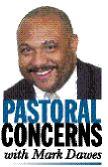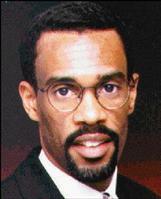

REV. GLENN PLUMMER, CHAIRMAN/CEO OF THE NRBLAST MONTH, the Rev. Glenn Plummer, 47, chairman and CEO of the United States-based National Religious Broadcasters Association (NRB) visited the island to examine some of the projects with which Food For the Poor (FFP) has forged partnerships.
Comprised of evangelicals and charismatics, the NRB membership is predominantly white, and mostly from radio. Glenn is the first black chairman/CEO in its 60-year history. The NRB is conservative both in its theology and in its politics.
It has had a long history of supporting the work being done locally by Food For the Poor. He was taken on a tour of some of the Mustard Seed Communities - where FFP has had a long partnership.
He was also taken to some inner-city housing projects, including St. Andrew Settlement in Majesty Gardens. He witnessed first-hand some of the squalor under which people reside and pledged the continued support of the NRB to assisting the FFP in its work to: provide shelter solutions, uplift the poor and assist the physically-challenged.
Glenn and his wife, Karin, founded the Detroit-based Christian Television Network (CTN) which began in 1982. They own television stations which broadcast Christian programming 24 hours a day seven days a week, by satellite and other technical means.
The primary audience of the CTN however, is the African-American community. The CTN has managed to attract a number of renowned black speakers including T.D. Jakes, Tony Evans and Myles Munroe.
Glenn himself hosts a daily one-hour live TV show which is the flagship show of the network. He explained that he got saved listening to Christian radio when he was 19 years old. About three years later "I received the Baptism of the Holy Ghost watching television," he said.
The founding of the CTN is an amazing tale. Glenn, an ordained minister and a producer, explained that he founded the station at a time when he did not have a VCR. It took him nine years to come on air with his first TV station. It took him five years to get his first license from the Federal Communications Commission, the media regulatory body in the United States.
The following is an edited version of an interview I conducted with the NRB chairman/CEO who last month completed the first year of his three year term.
Gleaner: What are your initial impressions of what you saw on tours of inner-city Kingston?
Plummer: Much more needs to be done. A good foundation has been laid. We need to take it to a spiritual level. The principle of scripture is feed him, then preach to him, and make a disciple out of him.
Gleaner: What was your own background prior to chairing the NRB?
Plummer: I served on the board of the NRB for many years. My key connection with the NRB came from the BNRB (Black National Religious Broadcasters Association) where I was chairman.
(He explained that one of his mentors in the BNRB was the Jamaican B. Sam Hart of Philadephia and who laboured in the Gospel principally with the Christian Brethren churches in St. Mary. B. Sam Hart was the first chairman of the BNRB which was formed about 28 years ago. He was also the first black elected to the NRB's board).
Gleaner: What have you set out to accomplish as chairman and CEO of the NRB?
Plummer: The NRB is made up of 1,600 different organisations. The primary purpose of the NRB is to gain access on the media for the Gospel. We live in a day in which whether it is Government, whether it is corporate business -- there is resistance to the Gospel. Our purpose is to ensure that there remains access. Sometimes we have to use legislation and use political influence other times we talk to general public, other times we have to deal directly with business interests and business executives.
My primary goal and desire is to position Christian broadcasters in new emerging technologies the Internet, satellite radio, satellite television. Cable in America is controlled by about five different individuals. There is a whole new dynamic happening in people's television viewing now. And we need to have access.
Gleaner: What is the present relationship enjoyed between the NRB and the FCC (Federal Communications Commission)?
Plummer: We have a good open relationship with the FCC at different levels. Our members deal with the FCC directly. On occasion when there is a problem or a concern we will file different comments officially representing the industry.
For example the FCC wanted to enforce what is called the "Fairness Doctrine." The Fairness Doctrine says that if a television or radio station airs one political candidate they have equal time for his opponent. Or if there was a statement made by someone on the air for one position, let's just say the position was pro-life, we then would have to give equal time for those who were pro-choice and/or pro abortion.
That was something we could not live with. So what we did was file comments. (Plummer explained that he helped mobilise NRB constituents who lobbied Congress and the bill was stopped).
Gleaner: What is the NRB's relationship with the current President?
Plummer: We don't necessarily endorse any President. Our relationship with the administration is very strong. Again I mention we are conservative. And so we have already been invited to the White House twice. Since I have been chair, I have met with the President. We have relationships with some of his senior advisors. So we have a good relationship with the White House.
Gleaner: What has the NRB accomplished in recent times?
Plummer: Firstly, when it comes to the business side, there was a merger that was to take place between Echo Star and DIRECTV. We decided to oppose that merger because it would have formed a monopoly. These are satellite TV companies and the only two that compete against cable in America. (The Dish Network which is owned by Echo Star was seeking to buy their only competitor DIRECTV which is owned by Hughes General Motors. After intense lobbying the deal was not approved. This happened on President George W. Bush's watch).
Secondly, there was a law that almost passed a few weeks ago a webcasting bill. There were going to be fees on anybody who stream any music on the Internet. If you decided to put any music on the Internet then you were liable for up to 12 per cent of the gross revenue of your business for fees to the record label. We were able to stop that."
Thirdly, we think we have impacted Jamaica with our partnership with FFP.
Gleaner: There is a lot of begging on religious air time, what are your impressions about this?
Plummer: It is an absolute necessity. The Christian broadcasting industry survives on contributions one way or the other. Secular radio and television survives on corporate dollars, commercials. The problem is that corporate America has not subscribed to religious broadcasting. So where are we going to get the money to do what we are talking about doing! So we have to turn to our constitutents. How else do you do it?
First of all, I think that the Lord established the Kingdom to be funded by his people. The Kingdom is still supported by tithes and offerings and the giving of God's people. Christian broadcasting is simply an extension of the local church and an extension and a part of the kingdom of God.
People who criticise Christian broadcasters for making financial appeals would probably be the same crowd that may complain about the church receiving an offering. The church has to receive an offering. It gives the people of God an opportunity to get blessed by giving and by blessing God's work.
Gleaner: Christian media houses tend not to produce very good news presentations, does it have to be that way?
Plummer: It is costly to do. It goes back to what is the financial basis of Christian television. It is not corporate America. So you don't have sponsors. We just cannot compete. In order to effectively compete, you got to have crews out there all the time, and editing is going on constantly. It is cost prohibitive.
Gleaner: How do you as NRB chairman ensure accountability among NRB members?
Plummer: We have a relationship with the Evangelical Council for Financial Accountability (ECFA). Any organisation that receives contributions of US$500,000 per year must be a member of EFCA to be a member of NRB. Any organisation whose contributions are less, still must subscribe to our code of ethics, our statement of faith. We have an ethics committee. If anyone files a complaint against a member, then the ethics committee will look at it.
As Christian broadcasters we all went through a difficult time about 15 years ago with Jimmy Swaggart and Jim Bakker. And it caused our whole industry to bring about a much higher level of accountability among ourselves.
Mark Dawes is a Senior Reporter. Send feedback to dawesmark@hotmail.com

